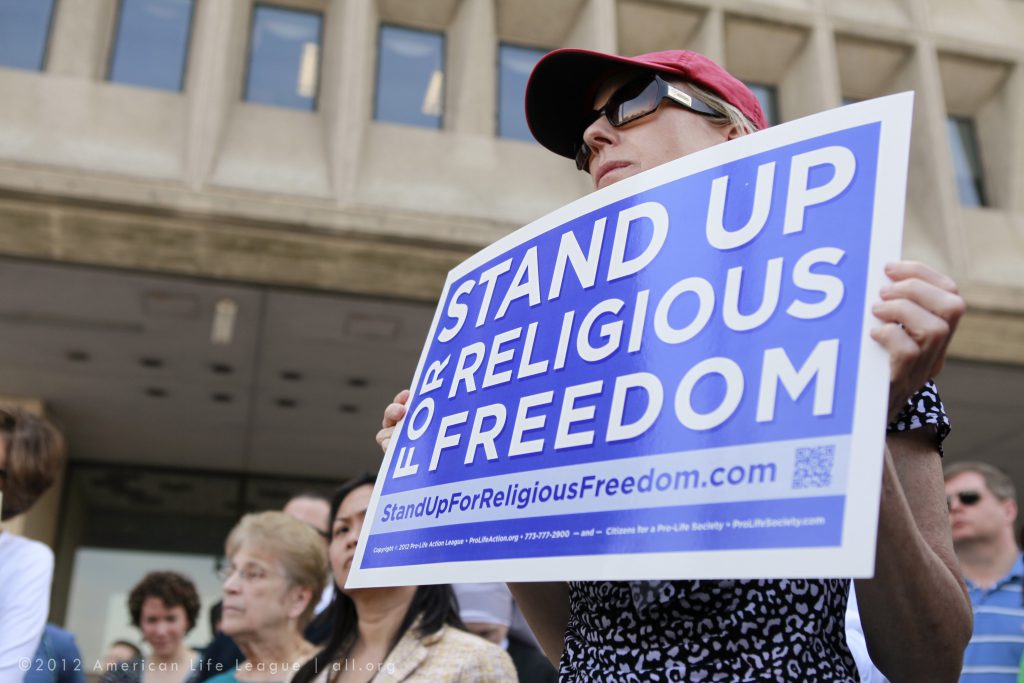In 2020, Melissa Rogers and E. J. Dionne Jr. of Brookings Institute released a report in which they highlight the importance of and offer recommendations for advancing religious freedom as a major foreign policy agenda point in the coming 2021 administration. In the domestic sphere, the report highlights the necessity to foster partnerships and cooperation with domestic faith-based and secular initiatives, local organizations, and NGOs to provide community relief during times of pandemic and increasing interpersonal tensions. In the United States, just as in any country, outreach to and inclusion of domestic religious minority communities is just as imperative as outreach to majority religious communities:
“And in light of attacks on religious pluralism during the last four years, outreach to Bahá’ís, Buddhists, Hindus, Jains, Jews, Muslims, Native Americans, Sikhs, and other non-Christian groups, is critical.”
The United States, however, must not only take into consideration religious freedom and plurality on domestic lines, but they also must continue to place religious freedom at the forefront of the foreign policy agenda. While under President Trump’s administration many positive steps were made with regards to religious freedom (i.e., raising the issue of violence against religious minorities in India and Nigeria, and the June 2020 Executive Order on Advancing International Religious Freedom), there are still many topics that need to be addressed in the coming years, such as the mass imprisonment of millions of Uyghurs in China, and the decrease in United States refugee resettlement, which shuts out thousands of individuals and families fleeing religious persecution abroad. Before the report makes important recommendations to the new administration with regards to what it should do to promote religious freedom, it makes a salient point:
“We simply cannot understand our nation or our world without understanding religion. To take the most basic of examples, a diplomat who will serve in Iraq must know the difference between Shia and Sunni Muslims. ‘Religion is a multivalent force, not reducible to good religion and bad religion,’ former Secretary of State John Kerry observed: Whether religion is a part of a problem or a part of a solution, ‘we ignore the global impact of religion at our peril.'”
The report recommends the re-establishment of the State Department’s Office of Religion and Global Affairs, which for 7 years acted as an advising office to multiple State Department officials and leaders on how religion and foreign policy are inherently interlinked, how to interact with faith communities domestically and abroad, and, according to the former office’s director Shaun Casey, “served as the portal for anyone who wanted to connect with the department on issues related to religion.”
Another recommendation “involves making the promotion of religious freedom part of a larger human rights agenda,” not only for the sake of promoting inalienable human rights and dignity, but also because it is imperative to national and international security. The United States, and all nations, cannot be silent on issues such as mass imprisonment, crimes against humanity, genocide, systemic discrimination, and persecution of religious and other vulnerable communities around the world.
The report calls for the immediate nomination of a new Ambassador-at-Large for International Religious Freedom by the new administration. The Ambassador serves as a leader for the Office of International Religious Freedom and engages with both the government and civil society to plan strategic initiatives with regards to advancing religious freedom. The Ambassador is a well-respected official that has the ability to “engage at high levels both domestically and abroad”, according to Knox Thames, a state department official and expert on human rights and religious freedom.
In order to provide insight on religion and foreign policy at higher-up executive levels, the report recommends that the National Security Council include a religious freedom expert who can coordinate with both State Department officials as well as presidential advisers and cabinet members. Such recommendation was also mentioned in the International Religious Freedom Act of 1998.
In order to preserve America’s reputation as a safe haven for persecuted refugees and asylum seekers, the report recommends rebuilding and strengthening refugee resettlement programs in the United States as an effort to “make good on its promise to protect human rights and to ease conflicts around the world. The refugee resettlement program has also long been an excellent example of the fine work government can do in cooperation with faith-based and humanitarian organizations.”
One of the final recommendations that the report makes with regards to the promotion of religious freedom on international stage is to foster “global alliances” by holding summits and dialogues to bring together various religious representatives and community leaders. These meetings allow intersectional discussion and problem-solving that would otherwise be improbable without an international stage to do so. Historically, these events hosted by the United States have drawn members of and highlighted the hardships of Muslims, Christians, Jews, Bahá’í, Yazidi, Hindu, Buddhist, and other religious minorities.
The report goes on to present a plethora of recommendations with regards to protecting religious freedom both globally and domestically. It is a timely and relevant tool that is necessary for the new administration with regards to maintaining religious freedom as a major piece of the United States agenda.
“The constitutional freedom of religion is the most inalienable and sacred of all human rights.” – Thomas Jefferson, Virginia Board of Visitors Minutes, 1819
Cover image: “Stand Up for Religious Freedom” by American Life League (CC BY-NC 2.0)

